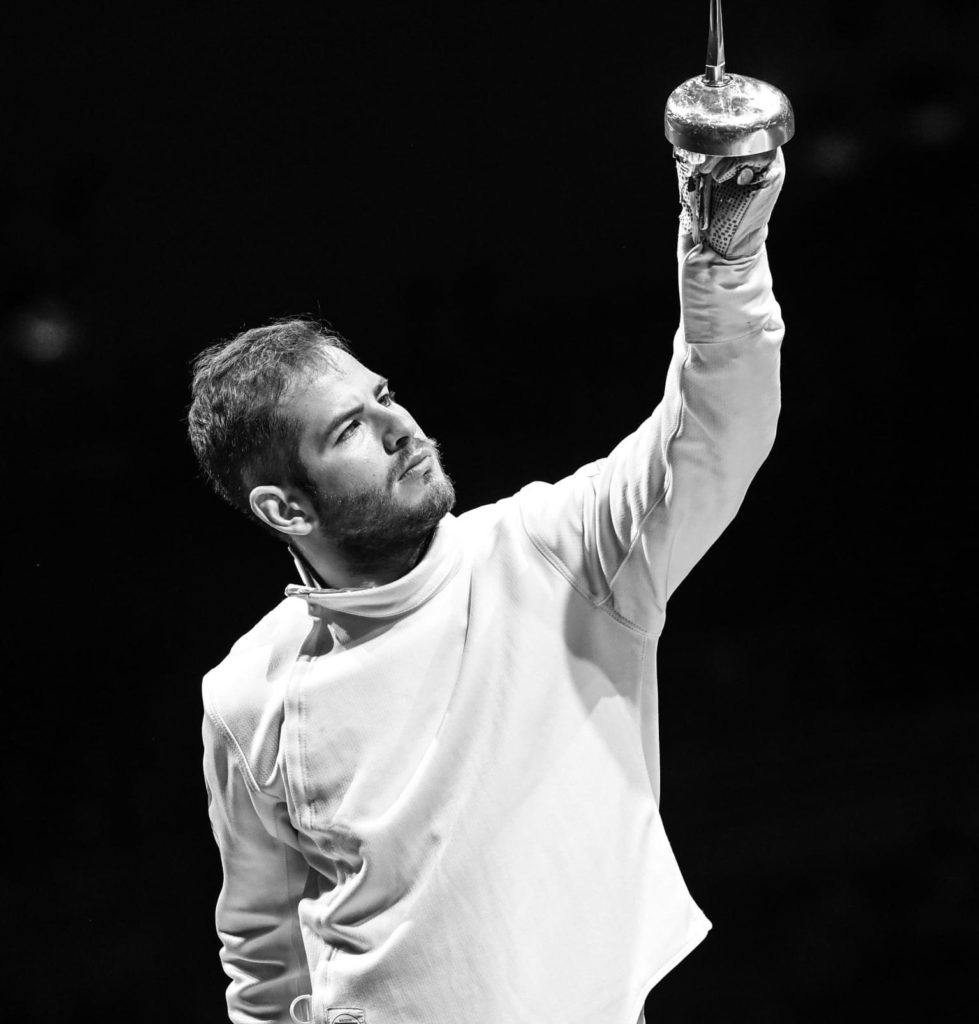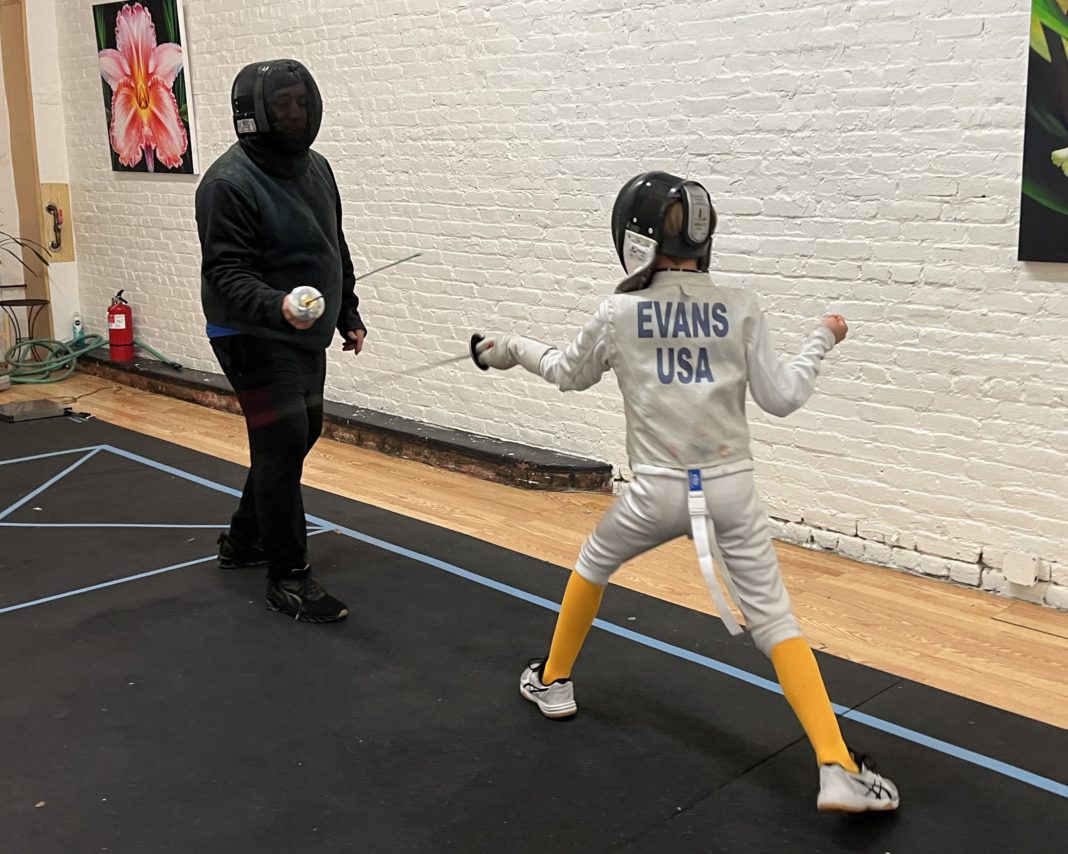When I heard a four-day national fencing tournament was coming to the Bay Area, I thought watching a few bouts might make for an entertaining morning. Instead, the tournament was exciting, peppered with political intrigue, fierce competition and strong camaraderie.
The field of competitors included Olympic medalists and hopefuls, veteran fencers in their 50s to 80s, teens, international fencers and local enthusiasts—both men and women. In fact, the January North American Cup (NAC) hosted more than 2,300 fencers from a dozen countries and 40 states at the San Jose Convention Center.
Some fencers were trying to earn points to qualify for the Olympics or Junior Olympics. Other competitors participated because they love fencing.
By chance, during the first bout, I stood next to Igor Chirashnya, the knowledgeable owner of the Academy of Fencing Masters, located in Campbell and Sunnyvale. Chirashnya explained his passion for the sport.
“Fencing is the most romanticized sport in the history of the world,” Chirashnya said. “We all grew up on stories of Alexander the Great, The Three Musketeers and Zorro. This is about sword fighting—beautiful and elegant.”
Chirashnya calls fencing the most democratic sport because it doesn’t discriminate against gender or body type. Unlike other sports, a fencer can be tall or short, slow or fast. Physical strength doesn’t guarantee a win. The key is intelligence—analyzing opponents and exploiting their weaknesses—comparable to a game of chess.
I eagerly accepted Chirashnya’s offer to introduce me to an Olympian who coaches at his fencing academy. While waiting, I Googled the coach’s name and discovered there was far more to his story.
Sergey Bida, 30, and his wife, Violetta Bida, 29, fled Russia last summer because they oppose the country’s ongoing invasion of Ukraine. Russia appears unhappy about the Bidas’ sudden departure to the U.S. The couple is now wanted by the Russian police for unspecified criminal charges, according to Mediazona, an independent Russian news outlet.
Currently, the Bidas are seeking U.S. citizenship, with Sergey Bida hoping to represent the USA in the Paris Olympics later this year, according to a text message from Jack Wiener, the couple’s attorney. Sergey Bida represents no country at the moment, but competes at tournaments as a “neutral.”

Both Bidas are remarkable athletes. Sergey Bida ranks as one of the top epee fencers in the world, winning the silver medal in the Tokyo Olympics and numerous medals in international competitions. Violetta Bida captured a silver medal in the 2019 World Fencing Championships and competed in the Tokyo Olympics.
Coaching is challenging but rewarding, Sergey Bida said. From his own experience, he understands the nuances of shaping fencers.
“I can see that my (coaching) system is working, as the technical and physical improvements of my students are significantly visible,” Sergey Bida said. “It is very interesting and exciting to combine the career of a professional athlete and a coach at the same time.”
Bout after bout, I watched men and women of almost all ages compete. Fencers are often graceful, moving like dancers. Then comes the attack, where a fencer tries to score a point by touching their sword to the opponent’s body.
There are three types of fencing disciplines, dictated by the weapon of choice: epee, foil and saber. The rules vary for each. For example, in epee, the entire body is fair game. Foil limits the parts of the body the sword can touch—torso only. When competing in saber, the target is from the waist to the top of the head and includes both arms.
I was hooked on fencing, even going back to watch the January NAC finals. Sergey Bida placed 5th in a field of 350 epee fencers.
Wanting to learn more about the sport, I contacted a local fencing school, the Marin Fencing Academy in San Rafael. Owner Tom Tully, along with other Marin and Petaluma fencers, also competed at the NAC tournament earlier this month.
“This is my sport,” Tully said. “Some people have a sailboat. I have a fencing academy.”
Tully, who loves fencing and enjoys talking about it, invited me to the academy to meet some of the 100 members.
Ernie Simac, 82, started fencing at age 65. The Petaluma resident was introduced to the sport through a summer class at the Petaluma Recreation Center. Although Simac has always been an athlete, going to the 1960 Olympics as an alternate for the U.S. equestrian team, he said fencing is now his only sport.
Simac holds the honor of being the most senior competitor at the January NAC tournament. While he keeps up with a rigorous training schedule—three to four days a week, for a couple of hours each day—Simac said that he puts in the time because he enjoys fencing and competing.
“It’s fun to compete and match your skills with somebody else,” Simac said. “Fencing is a strong mental challenge, and it inspires me.”
The Marin Fencing Academy also has Olympian coaches, including Dorina Vaccaroni, who started fencing when she was five or six. Vaccaroni has won Olympic gold, silver and bronze medals in women’s fencing.
“If you’re good, you continue,” Vaccaroni said. “I went to the Olympics at age 16 because I followed my dream. I never give up, and I teach the kids to never give up.”
Vaccaroni helps coach Lorenz Finney, 17, a foil fencer who’s following his dream. Finney, a Tam High student, started fencing when he was eight. Three years ago, he began competing in tournaments. Now, Finney is the highest-rated fencer at the Marin Fencing Academy, according to Tully. Finney doesn’t necessarily want to go to the Olympics, but he plans to continue fencing in college.
“I really like the competition aspect, strategizing against the opponents,” Finney said. “Through fencing, I’ve made friends and know different people across California.”
Desmond Evans, 10, is another impressive fencer who loves competing. Last year, at his first tournament, Evans placed 8th out of a field of 40. Not surprisingly, the Novato resident also gets straight As in school. Evans calls fencing his number one sport and encourages other kids to try it.
“I think they’d like fencing,” Evans said. “There are good coaches here (at Marin Fencing Academy), and the people are nice. One of my favorite things is traveling to tournaments and meeting new people along the way.”
After spending the weekend at the January NAC and visiting Marin Fencing Academy, I learned that every fencer is wildly passionate about the sport. It’s clear that fencers appreciate the camaraderie, even as they compete against one another. And who doesn’t love a sport where height and speed don’t matter?
Tully’s trying to convince me to take a fencing lesson. I think that I’ll take him up on it. En garde!







I was introduced to fencing at College of Marin in the late 50’s. I do not recall the name of the lady coach. I also was introduced to Judo (the “gentle sport”) by Coach McGraff. That and other martial arts proved very usefull in my chosen profession of Peace Officer (Resident Deputy Sheriff in the San Geronimo Valley for five years). I am about to turn 86 and have published two books about my 33 years of “keeping the peace.”